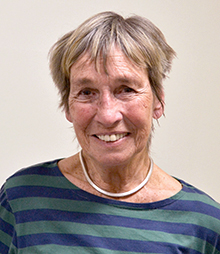Media Release
Date: 9 January 2020
RUH recruits first patient for Parkinson's disease trial
The first patient has been recruited for a UK-wide trial into tackling one of the most disabling complications of Parkinson's disease, led by the Royal United Hospitals Bath NHS Foundation Trust and the University of Bristol.
The trial, funded by a £2.1 million grant from the National Institute for Health Research (NIHR), will test whether a commonly prescribed dementia drug could prevent debilitating falls for people with the disease. Falls are a frequent complication of Parkinson's, leading to patients suffering from injuries and broken bones and often needing hospital admission.
RUH Research Lead Nurse Ruth Hamlin said: "To recruit our first patient is hugely significant and marks the official start of what is a really important study. While there is no cure for Parkinson's, our hope is that this research and its eventual findings will help to improve patients' quality of life."

Gitte Dawson
She said: "I'm very interested in this research and learning about its findings. It's very practical and do-able for a patient like me on a daily basis, which is important because we'll be taking part for a year."
The three-year trial is led by Dr Emily Henderson, a Consultant Geriatrician at the Royal United Hospital in Bath and Senior Lecturer at the University of Bristol. It will recruit 600 patients across 26 UK hospitals to determine whether a drug, known as a cholinesterase inhibitor (ChEi) will help people with Parkinson's.
Earlier phase trials have shown that ChEi treatment has potential to almost halve the number of falls and improves the regularity of walking, speed, and balance. Dr Henderson said: "This research will provide definitive evidence as to the role of these drugs for falls. We are working hard to tackle one of the most disabling complications of Parkinson's and, if successful, this treatment will improve the lives of people living with Parkinson's now and has the potential to be tested in other groups of patients who are at high risk of falling."
Trial patients will be randomly assigned a 12-month course of either a ChEi via a patch or a placebo (dummy) treatment. However, neither the researchers nor the participants will know which group they are in. Patients will be asked to record any falls that they experience in diaries that they post back each month for a year.
Dr Tim Craft, Trust Director of Research and Innovation, said: "I'm delighted that this trial has now begun and proud that the RUH is leading with the University of Bristol in such important research that has the potential to benefit people worldwide."
Findings from the trial, funded by the NIHR Health Technology Assessment programme (HTA), will be published in a research journal.
ENDS
Notes:
A refurbished and extended Research and Clinical Trials Centre has recently opened at the RUH.
Teams work collaboratively with universities, other NHS Trusts and the pharmaceutical industry to run around 300 different research studies at any given time. These range from trials into new treatments for diseases such as cancer, rheumatology and stroke through to studies that support patients with rehabilitation or chronic conditions like diabetes and heart disease, and many others that simply involve a blood test or data analysis. All research undertaken at RUH is externally funded through partnership with the National Institute for Health Research, research grants, charitable funds and commercial companies.
About the NIHR
The National Institute for Health Research (NIHR) is the nation's largest funder of health and care research. The NIHR:
- Funds, supports and delivers high quality research that benefits the NHS, public health and social care
- Engages and involves patients, carers and the public in order to improve the reach, quality and impact of research
- Attracts, trains and supports the best researchers to tackle the complex health and care challenges of the future
- Invests in world-class infrastructure and a skilled delivery workforce to translate discoveries into improved treatments and services
- Partners with other public funders, charities and industry to maximise the value of research to patients and the economy
The NIHR was established in 2006 to improve the health and wealth of the nation through research, and is funded by the Department of Health and Social Care. In addition to its national role, the NIHR commissions applied health research to benefit the poorest people in low- and middle-income countries, using Official Development Assistance funding.

